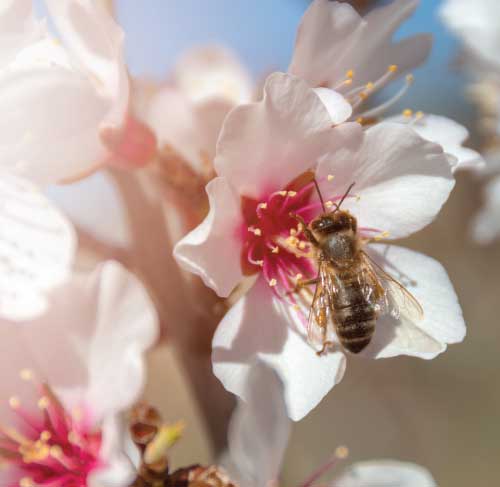The role of bees in the environment
The work of pollination carried out by bees remains one of the most important and irreplaceable natural processes present on our planet. The role of bees is extremely important for the environment. Human life is also influenced by all of this, but in what way?
The pollination of flowers and plants is a process that allows humans to enjoy fruits and foods of various kinds that would otherwise not exist. By this we mean that bees are responsible for around one third of the world's food available.
Without the exchange of pollen from one flower to another, many plant species would cease to reproduce and would no longer be available on our tables. Let's find out more on the subject.
How pollination works

The pollination of angiosperms is carried out mainly by bees. To survive, the swarms send the foraging bees of the family to collect large quantities of nectar and pollen . During this phase, the bees move from one flower to another. This is where the pollen exchange takes place. This mechanism allows plants to reproduce. Did you know?
Specifically: the transfer of a quantity of pollen from one flower to another allows the transport of substances between the male part of the flower and the female one. The fertilization of plants happens in this way. Plants develop with asexual reproduction . Thanks to pollination, flowers and plant species are able to develop seeds .
The role of pollinating insects is irreplaceable and allows many plants to proliferate. The Apis Mellifera or honey bee species manages to move away even a few kilometers from the hive. Not all types of bees collect nectar in the same way. In fact, some prefer certain flowers and are very selective.
Honey bees are the ones most protected by man since their work involves many plants. Apis mellifera feeds on a large number of flowers and that is why it is seen as the pollinating insect par excellence .
In addition to nectar, which is used both as food for larvae and by adults as fuel, female bees collect pollen, which is the exclusive source of protein for the brood. Most bees carry pollen in their hind legs, whose shins are equipped with a thick hair in which pollen is accumulated and retained during the flight.
What are pollinating insects?
Pollinating insects are all those species that actively contribute to the pollination process. For this reason they are also called pollinating insects . In this category we find lepidoptera, coleoptera, hymenoptera, diptera. Each sub-category affects the pollen exchange process in a different percentage.
Bees are certainly the most incisive pollinating insects and are divided into:
- Wild bees such as bumblebees or swarms of bees living wild in their natural habitat;
- “ Domesticated bees ” or bees present on farms and managed by beekeepers.
The importance of bees in the ecosystem
Protecting the life of bees is a very important step for our planet. The work of these small insects is an indispensable resource for the world we live in.
Bees are able to keep all the balance and well-being of the ecosystem stable. Swarms are estimated to be responsible for 35% of food production . One third of the world's food available depends solely on work done by pollinating insects.
Through their industriousness, bees guarantee the planet a correct biodiversity which is none other than the presence of different plant species. Biodiversity is vital for our survival as it is a very important element for the health of nature.
Although man is trying to replace natural processes through artificial pollination, for now the results are not very profitable. Moreover, sustaining this mechanism artificially requires very high costs.
It is very important to preserve the life of pollinators. Unfortunately, over the years, the number of bees has significantly reduced, so much so as to assume a subsequent gradual disappearance of the swarms.
Today, bees are one of the most important species to be protected and, for this reason, many initiatives and awareness campaigns have been promoted towards this issue.
The cause of the weakening of swarms and the depopulation of families of bees is attributable to certain human behaviors. Factors such as pollution, intensive agriculture and the use of pesticides have created negative consequences with a strong impact on pollinating insects.
Beekeepers and the protection of bees
Beekeepers currently carry out a great deal of protection and safeguarding work for bees. Beekeeping is a sector that has faced considerable difficulties in recent years.
For this reason, recently, the initiatives promoted in support of the beekeeping sector have been many. It is also important to intervene promptly through the planting of certain "bee-friendly" plant species that help the swarms to feed and survive.
Purchase queen bees, cores and bee packs
Are you a beekeeper? If you need to buy queen bees , bee packs or nuclei, you can do it directly online thanks to Apicoltura Laterza!
We are professional beekeepers, we produce virgin queen bees and fertile of Buckfast and Ligustica but also swarms, bee cores and packs of bees! We ship our products with professional methods throughout Italy but also throughout Europe.
Buy bees online at: www.apicolturalaterza.it

 English
English  Italiano
Italiano  Estonian
Estonian  Finnish
Finnish  Français
Français  Deutsch
Deutsch  Latvian
Latvian  Norsk
Norsk  Polski
Polski  Română
Română  Español
Español  Svenska
Svenska